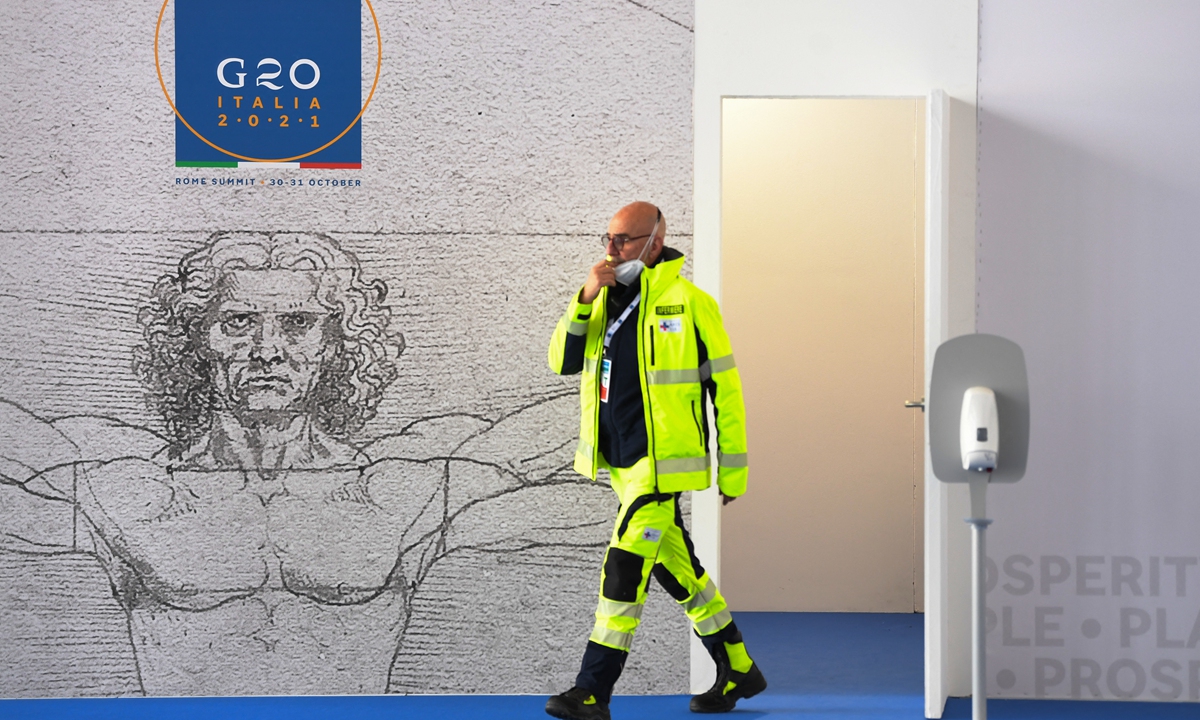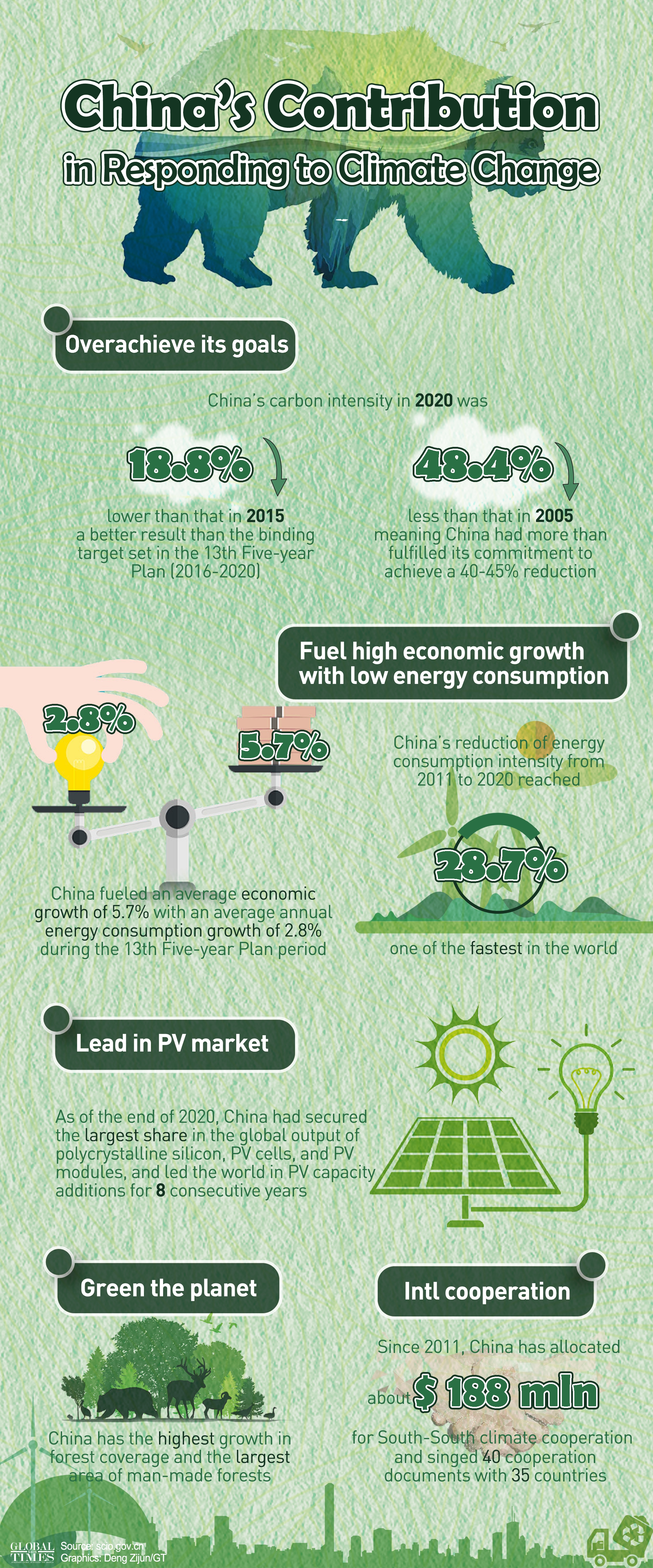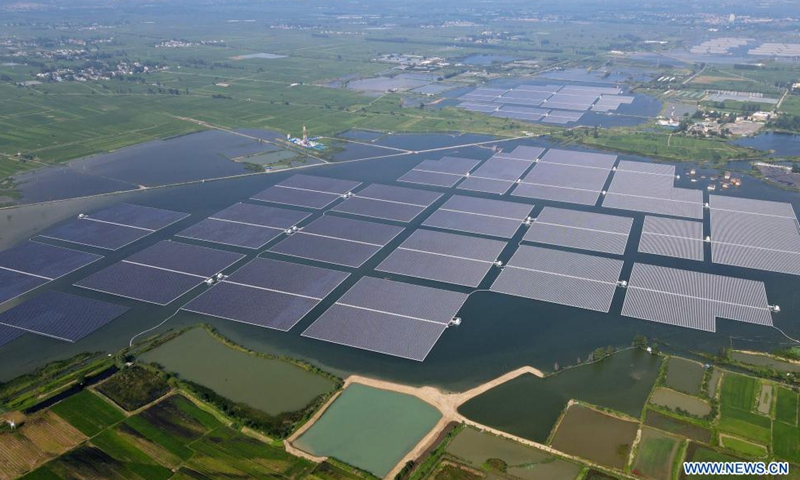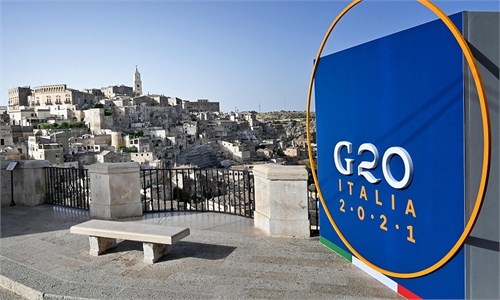China to offer own approach at G20 summit, COP26, inject hope in solving common challenges post pandemic

An employee is pictured outside the Palazzo dei Congressi, which will host the G20 summit with heads of state from major nations for a twoday meeting from October 30 to 31 in 2021 in Rome, Italy. Photo: AFP
At a time when the world is in desperate need of coordination, unity and hope to cope with common challenges, analysts called on developed countries to shoulder more responsibilities in not only dealing with climate change but also in boosting global economic recovery in the post-pandemic era. They also warned of the negative influence of the US over its unilateral practice of forming small cliques and using climate topics to attack China and other developing countries.
The Rome summit will focus on three themes - people, planet and prosperity. Leaders from the Group of 20 members are expected to discuss the coronavirus pandemic, how to foster global economic recovery and climate change.
The summit is held against the backdrop of a "global governance deficit" - the global economy, although with a good trend to recovery after being ravaged by the COVID-19 pandemic, still faces many problems like unbalanced development in different regions. Protectionism and unilateralism have hindered global efforts to offer solutions on urgent issues like vaccine distribution, poverty alleviation, economic recovery and climate change, analysts said.
At the invitation of Italian Prime Minister Mario Draghi, Chinese President Xi Jinping will attend the 16th G20 Leaders' Summit by video link and deliver a speech, Foreign Ministry Spokesperson Hua Chunying announced Friday.
President Xi also held a phone conversation with UK Prime Minister Boris Johnson on Friday.
Russian President Vladimir Putin will also attend the summit by video link. Other world leaders, including US President Joe Biden and Indian Prime Minister Narendra Modi, will attend in person in Rome.
Although affected in certain fields due to the unstable international situation, the G20 still serves as an important platform for countries to coordinate on dealing with global problems, such as economic recovery, health and climate, said analysts.
How to support low-income countries to increase their capability in dealing with the COVID-19 pandemic and how to deal with the disruption in the international supply chain due to the pandemic and restore a smooth global finance flow to help with world economic recovery would be discussed by G20 leaders, Wang Yiwei, director of the institute of international affairs at Renmin University of China, told the Global Times.
Wang noted that the theme of the Rome summit has echoed China's proposals on building a community of shared future for mankind and China's experience in fighting the coronavirus and boosting development may offer China's approach to the G20 agenda.
Chinese State Councilor and Foreign Minister Wang Yi will attend the G20 summit in person in Rome as President Xi's special representative over the weekend, Wang Wenbin, Chinese Foreign Ministry spokesperson, told a press conference on Friday.
Wang Wenbin said that in facing the continued spread of COVID-19 and accelerated changes and adjustments in the international economic landscape and global governance system, the world economic recovery is fraught with instability and uncertainty.
The G20, as a premier platform for international economic cooperation, should adhere to true multilateralism, uphold the spirit of solidarity and cooperation, seek common ground while shelving differences, build consensus on combating COVID-19, revitalizing the world economy and promoting inclusive and sustainable development and jointly address common challenges, he said.
Wang Wenbin noted that China is willing to work with all parties to promote the success of the Rome summit and contribute to an early global victory over COVID-19, and the steady recovery and growth of the world economy.

China's Contribution in Responding to Climate Change.Graphic:Deng Zijun/GT
Climate change will be a key topic for the Rome summit as COP26 will be held right after the G20 summit convenes and countries are expected to make more pledges on cutting emissions to realize the goal set in the 2015 Paris agreement, which committed signatories to keeping global warming to "well below" 2 degrees above pre-industrial levels, and preferably to 1.5 degrees.
COP26 president, Britain's Alok Sharma, said in a speech this month the G20, which accounts for 80 percent of global emissions, would be "make or break" for achieving success in Glasgow, Reuters reported.
Reuters also unveiled the content of a draft communiqué of the Rome summit, which said that the G20 reaffirms a commitment to "phase out and rationalize" fossil fuel subsidies by 2025 and to curb coal power, considered a principal culprit of global warming." But the Reuters report also noted that some of the world's biggest emitters, including China, say they cannot reach the 2050 target.
The US and some Western countries appear to be stepping up pressure on China to make more commitments ahead of the Glasgow summit. But Chinese experts noted that China is gearing up to phase out coal consumption and achieving its goal of carbon neutrality, and will not bow to external pressure.
China on Thursday submitted a renewed emissions reduction plan that promised to peak carbon pollution before 2030, confirmed its goal to achieve carbon neutrality before 2060 and slash its emissions intensity - the amount of emissions per unit of economic output - by more than 65 percent.
The West and the US have questioned China's sincerity and target on climate change, which is irrational. Developed countries had emitted for more than 150 years while developing countries only emitted in the past 30 years. Developed countries have no moral basis to ask developing countries to stop development to unreasonably cut emissions, Li Haidong, a professor at the Institute of International Relations of the China Foreign Affairs University, told the Global Times.
Li noted that the US has made many policies centered on competition with China and some analysts think that climate change may be one topic that the two sides could have cooperation. But one tactic that had been played by the US was to pressure others to be engaged while it stands aside.
Its previous actions- for example, the Bush administration's withdrawal from the Kyoto Protocol signed by the Clinton administration, and the Trump administration's withdrawal from the Paris Agreement signed by the Obama administration - made it hard for people to believe the promises made by the Biden administration will be honored by the next administration, the expert pointed out.
Climate change will also be the main focus for US President Biden during the G20 summit in Rome and then to Glasgow for the COP26 - to demonstrate US efforts to tackle climate change, ask other countries to adopt similar measures, and fix ties with European allies.
Biden is expected to emphasize the US goal of cutting its greenhouse gas emissions 50-52 percent by 2030 compared to 2005 levels, US national security adviser Jake Sullivan said on Tuesday, but continued haggling over the climate pieces in his Build Back Better bill may undermine his pitch as world leaders question how Washington will make good on its promises.
"The US has used climate change as a political tool to contain the development of developing countries, like China, by demanding radical goals and setting up restrictions on China's solar energy products," Lü Xiang, a research fellow at the Chinese Academy of Social Sciences, told the Global Times.
Lü noted that global technology cooperation is the key to tackling climate change. China has showed its utmost sincerity in inclusive and open cooperation with other countries to tackle the global challenges of the pandemic and climate change, but these Western countries may "dare not to look us in the eye."
"The US-led Western countries know about China's success, but they also know that they can't, so they would rather attack our success," Lü said.

Photo taken on July 20, 2021 shows a floating solar farm in Panji District of Huainan City, east China's Anhui Province.Photo:Xinhua
As a developing country, China has made sincere and concrete efforts to fulfill its promise of cutting emissions. As the world is suffering from an energy shortage, many countries have also had different opinions on making new pledges, analysts noted.
India on Wednesday dismissed calls to set forth a net-zero carbon emissions target, arguing such goals were not the solution to the climate crisis. Indian Environment Minister Bhupender Yadav was cited by media as saying that historical blame for the climate crisis lay with developed nations.
In climate change and public health, Western countries have a greater obligation as they continue to pressure developing countries on carbon emissions goals but do not shoulder their responsibility, and would rather let their own vaccine get wasted than sharing them with African countries, analysts said.
They also said that the international community should also be aware of the bad influence of protectionism and unilateralism at the G20 summit and other multilateral platforms.
Some experts reached by the Global Times said that the US has tried to sabotage multilateralism, and to build US-dominated cliques to contain countries like China in every field. Soon, the US may form a small clique for climate change to set up their rules that only benefit them and use these rules against others.
Lü said we need scientific research without boundaries, and reject technological protectionism.




